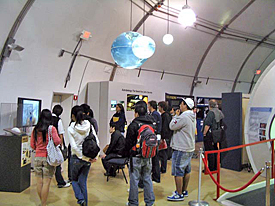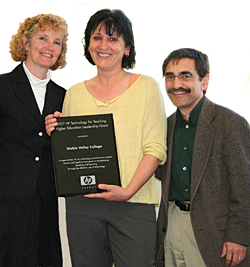Calculus field trips
 The DVC Mathematics Department has recently announced an exciting new outreach program
called Calculus Field Trips, or CFT. Funded by a grant from the National Science Foundation,
this special project integrates a field trip component into the calculus curriculum
that directly introduces students to a variety of math-related careers.
The DVC Mathematics Department has recently announced an exciting new outreach program
called Calculus Field Trips, or CFT. Funded by a grant from the National Science Foundation,
this special project integrates a field trip component into the calculus curriculum
that directly introduces students to a variety of math-related careers.
As part of their calculus coursework, students visit businesses, industries and organizations that use calculus in their practices and attend a presentation by a company scientist or engineer on topics related to the curriculum they are studying in class. In some cases, the speakers may give presentations at the DVC campus or deliver content in a web conference format.
After each field trip, students are assigned a collaborative project that simulates the scientific application they reviewed during their visit. These engaging experiences enhance learning, help make the connection between the classroom and the real world, and assist students with developing a better focus and purpose for their academic studies.
About a dozen calculus classes will participate in CFT in spring 2008, and again in fall 2008, and spring 2009. Organizations recently hosting field trips include the Dynamic Design Lab at Stanford University, BART Earthquake Safety Program, CalTrans, Molecular Sciences Institute, and Lawrence Berkeley National Laboratory. NASA Ames, DASSE Design Inc, Carollo Engineers, UCSF, Mountain View Sanitary District and the Environmental Protection Agency (EPA) are among the new participants this spring.
"The students find the field trips interesting, exciting and helpful to their learning," said Despina Prapavessi, DVC's CFT project director. "Ours is one of very few math departments in the country that connect with local businesses and industry in teaching the curriculum. It's a novel idea and holds a lot of promise."
These trips present a unique opportunity for students to experience the culture of a professional organization and get motivated to pursue internships and career paths.
"There is a steep decline in student interest to pursue careers in STEM (Science, Technology, Engineering, and Mathematics) fields," continues Prapavessi. "It is on the level of a national crisis and needs to be addressed. As educators we have a mandate to rethink our methods of teaching mathematics and improve student engagement and retention."
For more information on how to host a class field trip, please contact Despina Prapavessi (dprapave@dvc.edu) or fellow director Sam Needham (sneedham@dvc.edu).
In April 2005, Diablo Valley College received an HP "Technology for Teaching" grant to enhance the Calculus II curriculum using mobile technology. Under the course redesign, lead by Prapavessi, students used HP Tablets to record and analyze data collected in labs, access web based Mathematica notebooks and Java applets, collaborate, give class presentations, and report on field trips to organizations that use Calculus in their practices. It was the success of this field trip component using the HP tablets that later led to the writing of the NSF grant.
 Because of the overwhelming success of this classroom use of technology, HP recently
awarded Diablo Valley College with a Teaching Leadership Grant. This grant opportunity
was extended to recipients of 2005 and 2006 HP "Technology for Teaching" higher education
awards. DVC was among only 10 selected campuses (including public and private universities
and only two community colleges) who reported exemplary project results to date. The
college has received a cash and equipment award valued at more than $120,000. This
award is being used to expand the impact beyond DVC's campus in collaboration with
Contra Costa College and Los Medanos College math departments.
Because of the overwhelming success of this classroom use of technology, HP recently
awarded Diablo Valley College with a Teaching Leadership Grant. This grant opportunity
was extended to recipients of 2005 and 2006 HP "Technology for Teaching" higher education
awards. DVC was among only 10 selected campuses (including public and private universities
and only two community colleges) who reported exemplary project results to date. The
college has received a cash and equipment award valued at more than $120,000. This
award is being used to expand the impact beyond DVC's campus in collaboration with
Contra Costa College and Los Medanos College math departments.
"I could go on and on about how much the use of the tablets has enhanced my classroom teaching experience," said Prapavessi. "You can't just use the technology to teach the same way you did without it. Technology enables us to use a hands-on approach when teaching the math concepts. It is the exciting discoveries that my students and I are making together that is so rewarding. Best of all, students are keen on asking questions and work harder on the material and ultimately they are more successful. I hope this also means they are having more fun. I think it does."

